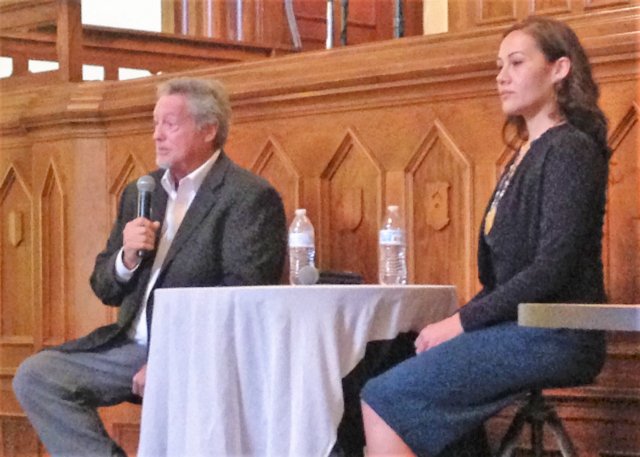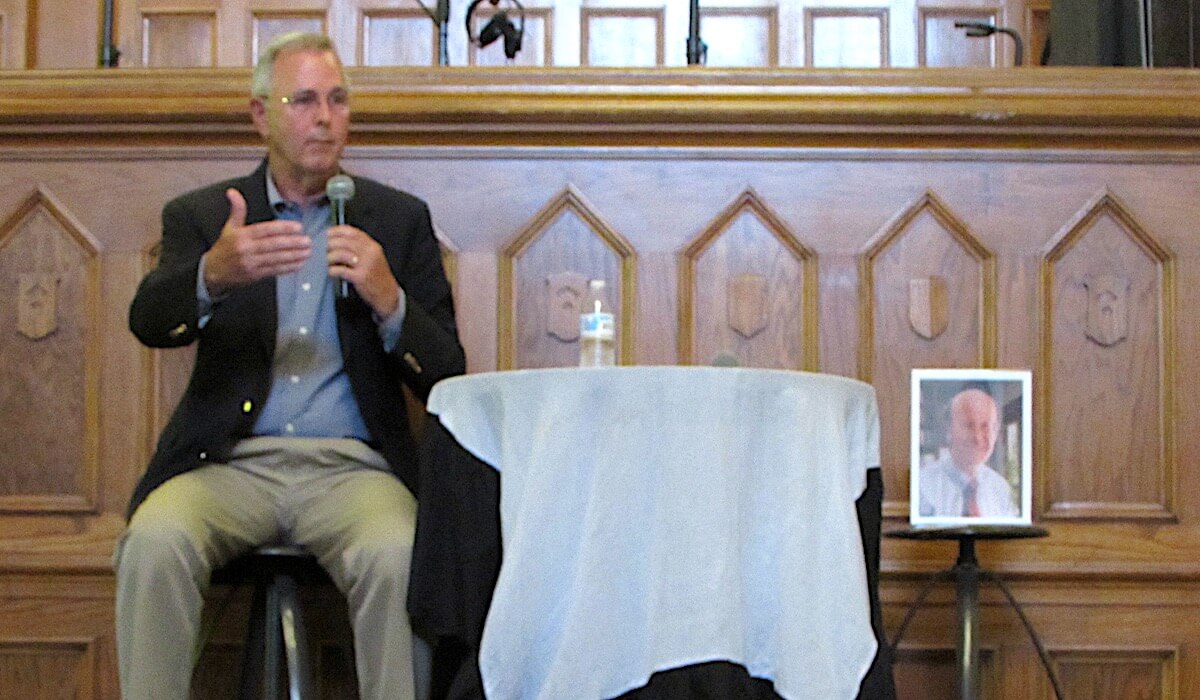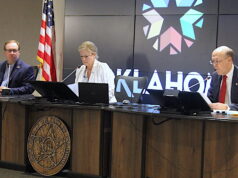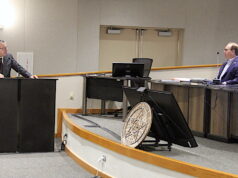
At an Oklahoma Corporation Commission candidate debate Tuesday, Democratic candidates emphasized a need for renewable energy sources and the protection of Oklahoma’s water.
Ashley Nicole McCray, 34, holds a master’s degree from both the University of Oklahoma and the University of Central Oklahoma. She described the state’s path as “destructive” in her opening remarks.
“I am running because I love Oklahoma and I love the land,” McCray said. “I know the path we’re on is destructive, not just to our environment, but to our economy, our securities and our futures and we need to redirect that path.”
Blake Cummings, 58, has spent 30 years in the oil and gas industry, experience he said would help him as a corporation commissioner. In his opening remarks, Cummings stressed the need for Oklahomans to elect a Democrat.
“It’s been since 1992, was the last time we elected a Democrat to corporation commission,” Cummings said. “And I think when you think about that, it’s the last time we helped education and teachers in the state of Oklahoma, too.”
McCray: ‘Time to say enough is enough’
Both candidates talked about wastewater injection wells in Oklahoma and discussed their effects on the environment, including a sharp increase in the number of earthquakes, predominantly in central, northern and northwestern Oklahoma. McCray called for incentives for companies to find ways to recycle wastewater.
“I would like to point out that we are currently serving as the disposal ground for five other states who have banned injection well dumping in their own states,” McCray said. “And I think it’s time to say enough is enough. We are not a disposable people, and this is not a disposable land.”
RELATED
Brian Bingman: Anthony ‘arrogant’ for debate absence by Ben White
McCray said “the evidence is clear” that injection wells have been linked to seismic activity, something the Corporation Commission has begun monitoring.
“Science tells us that dumping wastewater into injection wells is linked to earthquakes,” McCray said. “The reality is we are not going to end drilling any time soon. So if we are going to continue drilling then we need to consider alternatives like recycling wastewater.”
McCray’s website states she will, “make moves to reduce and eventually eliminate the number of injection wells we have in Oklahoma.”
Cummings said he wanted to hold oil and gas companies responsible for earthquake damages. But unlike his opponent, he has not called for in-state reduction of wastewater injection wells.
“Prohibit [wastewater dumping from] out of state? Absolutley,” Cummings said. “Prohibit in state? No. We hold them financially responsible and they’ll find something else to do besides injection wells.”
Cummings: ‘Tough it out with the rest of us’
The Oklahoma Corporation Commission oversees industries deemed vital to the public well-being. McCray said the most important responsibility of a corporation commissioner is to protect Oklahoma’s drinking water.
“I think the application process that is involved in the Corporation Commission puts the onus of responsibility on the community,” McCray said. “I think we need to reverse that by putting the onus of responsibility on the corporations and the industries that seek to profit off of these projects.”
Cummings talked about the need for better internet connectivity for rural Oklahomans, especially for children.
“We need to ensure our children have bandwidth and research capabilities and the internet at their fingertips. Also schools, hospitals and libraries,” Cummings said. “The kids that live in town are getting their homework done, as far as internet research, four to five times faster than kids that are in the country.”
The Corporation Commission also oversees the rates Oklahomans pay for utilities like electricity and natural gas. Both Democratic candidates discussed a delicate balance between valuing the needs of the public with the needs of utility companies. Cummings talked about keeping rates down for consumers, especially for those on fixed incomes.
“I would say, looking at different things, if Oklahoma is in a recession and our people don’t have spendable income this year, it’s decreased, and if (utility companies) come for an increase, my vote would be ‘No.’ You’re going to have to tough it out with the rest of us,” Cummings said.
McCray and Cummings both expressed support for increased renewable energy sources, each saying they would have approved the controversial and now-withdrawn Wind Catcher project. Cummings said he wanted to give renewables the same treatment as oil and gas companies in the state.
“I’m a big fan of alternative energy,” Cummings said. “I would like to see wind and solar and these alternative energies to be treated on a level playing field with oil and gas. I think we need to be the energy state of this century.”
McCray offered economic and security reasons to support alternative energy sources, which she said deserve incentives for individual homeowner investments.
“Communities that rely on renewable energy for their utility budgets are able to have economic security for at least 25 years down the road,” McCray said. “It’s also good for our security, too. Because we know in the age of cyber attacks and hacking (…) that it’s very possible our grid will be attacked. If we’re relying on renewable energy or supplementing with renewable energy, if our grid ever does collapse, then we can actually trigger our own power back on individually.”
Both candidates talked about the need for increased community participation in the Corporation Commission. McCray talked about adopting a wider mandated public comment period for new wells proposed by oil and gas companies.
“The mandate we currently have in the Corporation Commission only has (a public notification range) of 1.5 miles from the center of the well,” McCray said. “I think that leaves out a lot of community input from people who are being impacted by these projects.”
While the Corporation Commission does not set tax policy, Cummings said he supports a gross production tax of 7 percent on oil and gas production.
“Personally, I think if a company thinks they’ve got to have a 2 percent gross production tax, they’re probably not running their company very well,” he said. “Because fortunes have been made paying 7 percent in the state of Oklahoma and we need to go back to that.”
In March, the Legislature raised Oklahoma’s gross production tax incentive rate from 2 percent to 5 percent over the first 36 months of a well’s production. After that, the rate moves to 7 percent.
Runoff election Aug. 28
McCray led the June primary election with 48.7 percent of the popular vote compared to Cummings’ 22.1. The winner of next Tuesday’s election will face either former Senate pro tempore Brian Bingman or incumbent Bob Anthony.
Both Democratic candidates stayed for the Republican portion of the night, which featured only GOP challenger Brian Bingman. Incumbent Bob Anthony did not attend the night’s debates.
The Democratic portion of Tuesday’s debates can be found in the Facebook videos embedded below. Owing to technical difficulties, small portions of the debate were not recorded in these videos:






















